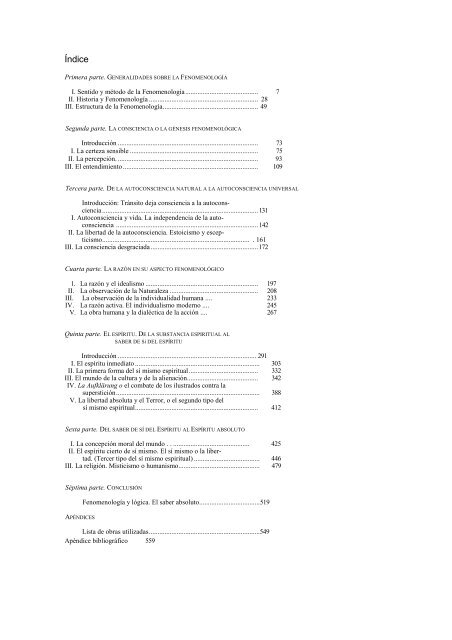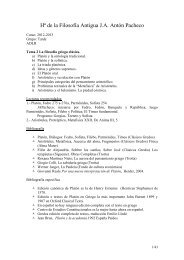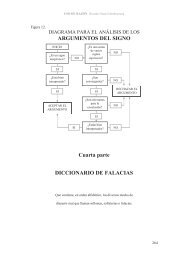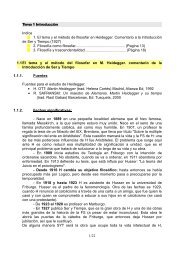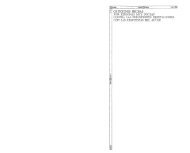- Page 1 and 2:
Jean Hyppolite GÉNESIS Y ESTRUCTUR
- Page 3 and 4:
plantea para él el problema clel c
- Page 5 and 6:
sino que la reflexión será un mom
- Page 7 and 8:
autosaber y el del mundo, Hegel pue
- Page 9 and 10:
afirmar; «El sistema completo de l
- Page 11 and 12:
transcenderse que va del concepto a
- Page 13 and 14:
hegeliano es de distinto tipo; se t
- Page 15 and 16:
saber en lo que tiene por verdadero
- Page 17 and 18:
II. Historia y Fenomenología I. El
- Page 19 and 20:
con la vida. La vida orgánica en t
- Page 21 and 22:
pertenecen, es diferente de la Natu
- Page 23 and 24:
precisar su descripción. Sabemos,
- Page 25 and 26:
consiste en considerar al individuo
- Page 27 and 28:
constituye su propia reflexión sob
- Page 29 and 30:
este mundo en el pasado entregándo
- Page 31 and 32:
ofrecérsele como contingencia. Es
- Page 33 and 34:
III. Estructura de la «Fenomenolog
- Page 35 and 36:
lo mismo en la segunda parte. Los e
- Page 37 and 38:
pensamiento que se busca, se reempr
- Page 39 and 40:
yo tiene la certeza abstracta de s
- Page 41 and 42:
para sí misma». 139 Finalmente, e
- Page 43 and 44:
Estudiaremos más particularmente e
- Page 45 and 46:
verdad de la razón; y resultaba im
- Page 47 and 48:
que las comunidades estaban todaví
- Page 49 and 50:
SEGUNDA PARTE LA CONSCIENCIA O LA G
- Page 51 and 52:
En el prólogo a la Fenomenología
- Page 53 and 54:
embargo, la relación inmediata de
- Page 55 and 56:
ello. Resulta imposible, dice Arist
- Page 57 and 58:
prueba por sí mismo su propia inco
- Page 59 and 60:
este universal no se opone así mis
- Page 61 and 62:
mediación, por consiguiente, que e
- Page 63 and 64:
tiene la negación, la diferencia o
- Page 65 and 66:
elementos y potencias absolutas, pe
- Page 67 and 68:
pensamiento que nunca es posible se
- Page 69 and 70:
verdadero, y lo que viene de nuestr
- Page 71 and 72:
a partir de ella se desarrollan los
- Page 73 and 74:
Fenomenología. La fuerza se desdob
- Page 75 and 76:
consciencia perceptora ponía alter
- Page 77 and 78:
como, por otra parte, dicha indepen
- Page 79 and 80:
como lo universal sin el sí mismo
- Page 81 and 82:
d) La explicación. Necesidad anal
- Page 83 and 84:
enunciar al pensamiento. Por eso de
- Page 85 and 86:
identidad de lo absoluto y las dife
- Page 87 and 88:
misma extinguiéndose tanto el movi
- Page 89 and 90:
TERCERA PARTE DE LA AUTOCONSCIENCIA
- Page 91 and 92:
esencialmente consciencia práctica
- Page 93 and 94:
existencia humana—, que mucho ant
- Page 95 and 96:
sólo se alcanza a sí misma en el
- Page 97 and 98:
I. Autoconsciencia y vida La indepe
- Page 99 and 100:
ella, pues no permanecen ante las c
- Page 101 and 102:
descubro la independencia del objet
- Page 103 and 104:
deseo, pero deseo que se pone en su
- Page 105 and 106:
consciencia comprometida en la expe
- Page 107 and 108:
pertenece al esclavo trabajador y n
- Page 109 and 110:
amo hace en el esclavo no lo hace e
- Page 111 and 112:
negación del ser de la vida y por
- Page 113 and 114:
tiempo de temor y esclavitud univer
- Page 115 and 116:
ealiza la verdadera negación de es
- Page 117 and 118:
decirlo así, sin saberlo la consci
- Page 119 and 120:
forma concreta la desgracia de la a
- Page 121 and 122:
la vida con la infinitud del yo, de
- Page 123 and 124:
La primera forma de oposición es l
- Page 125 and 126:
paradójico— es esta situación p
- Page 127 and 128:
sustancia. En cambio, la primera es
- Page 129 and 130:
inmutable, mientras que en el conce
- Page 131 and 132:
negatividad exterior, en el deseo y
- Page 133 and 134:
abandonado.» 442 La existencia sin
- Page 135 and 136:
surge. Esta nueva etapa será la un
- Page 137 and 138:
ealidad objetiva. Tanto en la Encic
- Page 139 and 140:
Este momento corresponde al Renacim
- Page 141 and 142:
experiencia complementaria, la de l
- Page 143 and 144:
II. La observación de la Naturalez
- Page 145 and 146:
debido a que, aun ajando es razón,
- Page 147 and 148:
decir, justamente el movimiento gra
- Page 149 and 150:
desarrollo de la consciencia— tod
- Page 151 and 152:
autoconsciente. De todas formas, el
- Page 153 and 154:
en la esencia misma de la razón, e
- Page 155 and 156:
interno puede parecer paradójica,
- Page 157 and 158:
contra Schelling, cuya filosofía d
- Page 159 and 160:
por lo demás, no encuentran su ade
- Page 161 and 162:
La vida orgánica no es, como la vi
- Page 163 and 164:
El tránsito de la vida a la autoco
- Page 165 and 166:
cread: por él mismo? 542 Debemos r
- Page 167 and 168:
capacidad para serlo.» 549 Un acto
- Page 169 and 170:
estará en la forma del ser para s
- Page 171 and 172:
fenoménica, nuestro objeto será e
- Page 173 and 174:
jetivamente, no lo es objetivamente
- Page 175 and 176:
a) El placer y la necesidad. Vamos
- Page 177 and 178:
quiere, una muerte de cada instante
- Page 179 and 180:
Pero la experiencia realizada por l
- Page 181 and 182:
del mundo», la apariencia de una m
- Page 183 and 184:
como una potencia que todavía no s
- Page 185 and 186:
esumen así: La individualidad empe
- Page 187 and 188:
Hemos intentado señalar desde el c
- Page 189 and 190:
Vamos a observar más minuciosament
- Page 191 and 192:
no es en sí distinto de nosotros;
- Page 193 and 194:
negatividad es un acto, el proceso
- Page 195 and 196:
consciencia ha descubierto en su ob
- Page 197 and 198:
es para mí. La cosa misma por medi
- Page 199 and 200:
IV. La razón legisladora y la raz
- Page 201 and 202:
como algo arbitrario y ajeno a él.
- Page 203 and 204:
hasta el saber de sí del espíritu
- Page 205 and 206:
compacto y que, por así decirlo, n
- Page 207 and 208:
intuición que de sí mismo tiene l
- Page 209 and 210:
Hegel parece singularmente arcaica.
- Page 211 and 212:
momento la sustancia quedará disue
- Page 213 and 214:
democrático. El Estado es obra de
- Page 215 and 216:
hundiéndose en este orden, se sepa
- Page 217 and 218:
interpreta en su sistema. Por eso d
- Page 219 and 220:
serán la persona abstracta, la cul
- Page 221 and 222:
expresado en el opúsculo sobre el
- Page 223 and 224:
sin la otra; pero el entendimiento
- Page 225 and 226:
habrá perecido y lo que va a salir
- Page 227 and 228:
intenta convencerla astutamente. An
- Page 229 and 230:
decadencia que la potencia ética d
- Page 231 and 232:
allá de la realidad, de otra parte
- Page 233 and 234:
propiedad, «ésta cubre ahora todo
- Page 235 and 236:
punto es sin la separación de su u
- Page 237 and 238:
externas, es decir, el despotismo d
- Page 239 and 240:
En el primer momento dialéctico de
- Page 241 and 242:
El citado dualismo es característi
- Page 243 and 244:
solamente objetiva, con su propia c
- Page 245 and 246:
naturaleza inmediata. Por consiguie
- Page 247 and 248:
desarrollo de la autoconsciencia, s
- Page 249 and 250:
espíritu mismo es el ser-en-sí-y-
- Page 251 and 252:
Jena. 836 2. Los momentos para la a
- Page 253 and 254:
estado espiritual de una aristocrac
- Page 255 and 256:
esencial.; 846 por eso, el honor, g
- Page 257 and 258:
la relación de completa desigualda
- Page 259 and 260:
pobreza.» Pero esta desigualdad qu
- Page 261 and 262:
consagraba al servicio del Estado,
- Page 263 and 264:
ideas tan justas y al mismo tiempo
- Page 265 and 266:
sabe y afirma la vanidad de este mu
- Page 267 and 268:
con el modo de la alienación se pr
- Page 269 and 270:
verdad, es en una unidad inseparabl
- Page 271 and 272:
ción triunfa sobre la fe; denuncia
- Page 273 and 274:
derecho y la moralidad en una autor
- Page 275 and 276:
frecuentemente en los primeros ensa
- Page 277 and 278:
ser para sí de la consciencia, y,
- Page 279 and 280:
completa de lo divino a lo humano i
- Page 281 and 282:
eligión no es sino la consciencia
- Page 283 and 284:
consolidarse de este modo no son m
- Page 285 and 286:
mundo». «Tal como salió en un pr
- Page 287 and 288:
Pero ahora esta verdad ha perdido t
- Page 289 and 290:
singular se eleva a este objeto en
- Page 291 and 292:
efectividad tiene el valor de lo ve
- Page 293 and 294:
desprenderse nada de ella en la for
- Page 295 and 296:
solamente la perfecta compenetraci
- Page 297 and 298:
consciencia. El espíritu cierto de
- Page 299 and 300:
sea él mismo. «Quererse a sí mis
- Page 301 and 302:
moralismo— subrayemos sus princip
- Page 303 and 304:
mismo de nuestra dialéctica, se re
- Page 305 and 306:
puro pensamiento, son en sí una co
- Page 307 and 308:
la otra consciencia lo que no podem
- Page 309 and 310:
consciencia de la efectividad, de l
- Page 311 and 312:
semejante como el objeto real de nu
- Page 313 and 314:
a esta representación de su verdad
- Page 315 and 316:
De este modo, Hegel recoge su conce
- Page 317 and 318:
una totalidad 1040 —aunque sea in
- Page 319 and 320:
contingencia se capta como plenamen
- Page 321 and 322:
es en sí solamente como es en dich
- Page 323 and 324:
la ley para el sí mismo, no el sí
- Page 325 and 326:
también vacía, lo mismo que el pu
- Page 327 and 328:
cuenta es la convicción de que est
- Page 329 and 330:
sentido prosaico que se ocultaba de
- Page 331 and 332:
independiente en sus leyes, y que s
- Page 333 and 334:
universalmente reconocido como algo
- Page 335 and 336:
criminal, no parece que haya posibi
- Page 337 and 338:
prescinde de ese recuerdo (lo finit
- Page 339 and 340:
infinito al margen de lo finito, lo
- Page 341 and 342:
moral del mundo, sino que es el esp
- Page 343 and 344: espíritu del mundo que tiene en el
- Page 345 and 346: se sabe como en sí y para sí mism
- Page 347 and 348: discípulos. El espíritu absoluto
- Page 349 and 350: interno; le falta el «lenguaje, el
- Page 351 and 352: mismos. La ciudad | misma se honra
- Page 353 and 354: naturaleza, sino Mnemosine, el desp
- Page 355 and 356: actores. 1162 Es el sí mismo del a
- Page 357 and 358: pensada es distinta de la necesidad
- Page 359 and 360: significación la dialéctica del e
- Page 361 and 362: una imagen romántica, el espíritu
- Page 363 and 364: sustancia se ha hecho efectivamente
- Page 365 and 366: pensamiento del sí mismo, esta ont
- Page 367 and 368: que se está hablando de él como d
- Page 369 and 370: nosotros», ha pasado a ser para la
- Page 371 and 372: entonces, la noche en que todos los
- Page 373 and 374: Fenomenología, la experiencia —q
- Page 375 and 376: dicho ser, y este pensamiento sin e
- Page 377 and 378: suprimida o de la determinación, h
- Page 379 and 380: tanto que relación, lo que se opon
- Page 381 and 382: que un querer, y si se sigue dando
- Page 383 and 384: la naturaleza. «La misma palabra c
- Page 385 and 386: ma del libre acaecer contingente—
- Page 387 and 388: hegeliano. J. WAHL, Le malheur de l
- Page 389 and 390: MICHELET, Entwicklungsgeschichte de
- Page 391 and 392: H. HERR, La grande Encyclopédie, t
- Page 393: H. RAURICH, Notas para la actualida


